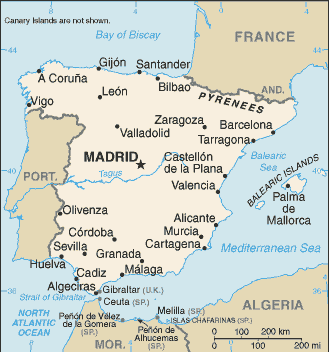
Beginnings of the Jews in Spain, through the period of Muslim Rule,
selected from: The Virtual Jewish History Tour - Spain
Introduction
The history of Spanish Jewry dates back at least two thousand years to when the Romans destroyed the Second Temple in Jerusalem, and brought Jews with them back to Europe. Since that time, the Jews of Spain (Sephardim) have experienced times of great oppression and hardship, as well as periods of unprecedented growth and renewal.
Roman Rule (ca. 205 BCE-Early 5th Century)
While the area of modern-day Spain (formerly a collection of kingdoms which included Castile, Aragon, and Catalonia) was still controlled by the Holy Roman Empire, the Catholic Church convened at the Council of Elvira where they issued 80 canonic decisions, many of which were intended to ostracize the Jews from the general Spanish community. For example, Canon 49 prohibited Jews from blessing their crops, and Canon 50 refused communion to any cleric or layperson that ate with a Jew.
Visigoth Rule (5th Century-711)
During the early 5th century, the Visigoths captured the Iberian Peninsula from Roman rule. While initially anti-Christian, the Visigoths later converted to Christianity and adopted many of the previous laws that existed during Roman rule. Under the rein of Toledo III, children of mixed marriages were forcibly baptized and Jews were barred from holding public office. The situation got progressively worse and, in 613, the Jews were ordered to convert to Christianity or face expulsion. Though many Jews chose to leave rather than convert, a large number of them still practiced Judaism in secret for centuries. In 633, the Fourth Council of Toledo, convened to address the problem of crypto-Judaism (Jews who converted to Christianity to escape persecution, yet observed Jewish law in private. The people who practiced this were also know as Marranos). While opposing compulsory baptism, the Council decided that if a professed Christian was determined to be a practicing Jew, his or her children were to be taken away and raised in monasteries or trusted Christian households.
Muslim Rule (711-11th Century)
In the 8th century, the Berber Muslims (Moors) swiftly conquered nearly all of the Iberian Peninsula. Spain flourished under Muslim rule, and Jews and Christians were granted the protected status of dhimmi. Though this still did not afford them equal rights with Muslims, during this “Golden Age” of Spain, Jews rose to prominence in society, business, and government.
The conditions in Spain improved so much under Muslim rule that Jews from all across Europe came to live in Spain during this Jewish renaissance. There they flourished in business and in the fields of astronomy, philosophy, math, science, medicine, and religious study. The same period also witnessed a resurgence of Hebrew poetry and literature from a traditional and liturgical language to a living language able to be used to describe everyday life. Among the early Hebraists of the time were Yehudah HaLevi who became known as one of the first great Hebrew poets, and Menahem ben Saruq who compiled the first ever Hebrew dictionary.
The intellectual achievements of the Sephardim (Spanish Jews) enriched the lives of non-Jews as well. In addition to contributions of original work, the Sephardim translated Greek and Arabic texts, which proved instrumental in bringing the fields of science and philosophy, much of the basis of Renaissance learning, to the rest of Europe.
In the early 11th century, centralized authority based at Cordoba broke down following the Berber invasion and the ousting of the Umayyads. Rather than having a stifling effect, the disintegration of the caliphate expanded the opportunities to Jewish and other professionals. The services of Jewish scientists, doctors, traders, poets, and scholars were generally valued by the Christian as well as Muslim rulers of regional centers, especially as recently conquered towns were put back in order.
Yet, despite the Jews’ success and prosperity under Muslim rule, the Golden Age of Spain began to decline as the Muslims began to battle the Christians for control of the Iberian Peninsula and Spanish kingdoms in 722. The decline of Muslim authority was matched with a rise in anti-Semitic activity. In 1066, a Muslim mob stormed the royal palace in Granada, crucified Jewish vizier Joseph ibn Naghrela and massacred most of the Jewish population of the city. Accounts of the Granada Massacre state that more than 1,500 Jewish families, numbering 4,000 persons, were murdered in just one day. The conditions of Jews living on the Iberian Peninsula (Spain and Portugal) steadily began to worsen again. As a result, many people started fleeing the Iberian Peninsula to neighboring nations. Among those who fled were the famed bible commentators Abraham Ibn Ezra and Rabbi Yosef Karo (author of the Shulchan Aruch), as well as the families of Maimonides and philosopher Baruch Spinoza.

No comments:
Post a Comment